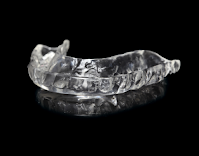Teeth Grinding
Wearing of the chewing surfaces if your teeth occurs normally throughout life at a slow pace. Just the friction of the upper and lower teeth moving against one another wears away your enamel. You don't notice it because it is such as low process. Though, you might notice that the biting surfaces if your lower incisors appear more yellow than they used to. Depending on your age, the yellow you are looking at is probably dentin (the layer under enamel). You may have also noticed that your upper front teeth are beginning to chip.
The normal process of attrition can become greatly accelerated if your teeth don't fit together properly. In other words, if your normal bite is off to one side and not evenly balanced with the teeth interlocking, you can have problems with excessive loss of tooth structure. One out of every four adults falls into this category a some level. Grinding and clenching are usually a physical manifestation of stress. It occurs at night while you are asleep; most are unaware that they even do it.
When this type of nonfunctional wear of the teeth occurs, the enamel will wear much more quickly than normal. Over time, the enamel gets much thinner and can be completely worn away. If this happens, the underlying dentin of the tooth is exposed. Once the softer layer of dentin is exposed, wear occurs at a faster rate. Eventually, enough structure has been worn way to make the tooth prone to chipping and fracture. The more porous nature of dentin picks up stain much faster than normal teeth. Coffee, tea, and red wine are notorious for staining dentin.
Bruxism is considered a parafunctional habit where the teeth are clenched or ground together repeatedly; it affects somewhere between 50% to 90% of adults in the US and approximately 15 % of children.
What causes bruxism?
There is no one cause; it's usually brought about by one or more of the following factors:
- Poor occlusion (the teeth don't fit together properly)
- Emotional stress
- Type -A personalities
Signs and Symptoms of Bruxism
- Tooth wear
- Facial muscle pain and fatigue
- Headaches
- Locking and clicking of the jaws
- Sensitive teeth
- Tooth mobility
- Tooth fractures
Risks associated with untreated bruxism
Poor esthetics/ appearance of teeth due to loss of their natural shape, color and translucency
Increased staining of dentin
Sensitivity to hot and cold temperature r air stimulation
Greater risk for tooth related trauma and increased costs at the dentist
Treatment for bruxism
Fabrication of a nightguard to be worn at night or when you are at most risk of grinding and clenching. The nightguard prevents your teeth from touching and creating further damage. Nightguards usually last a couple years, though, depending on the strength of your bite and frequency with which you grind, they can last anywhere from a few months to a few years.
In mild cases of attrition or grinding where there is a small amount of tooth loss, tooth-colored bonding can restore teeth to a more esthetic appearance.
In cases if TMJ involvement, restoring fractured and worn posterior (back) teeth with onlay or crown restorations may be necessary to reestablish the proper TMJ relationship.
Because it's thought that an abnormal bite may predispose a person to grinding, treatment may also involve removing the 'high spots' on some of your teeth, which will allow them to fit better with the opposite arch.
When stress is determined to be the major cause, people need to find ways to relax. A good way to start is by cutting out some of the caffeine, Your dentist may prescribe muscle relaxants depending on the severity of your case. Physical therapy may also be needed to alleviate jaw pain.
The bottomline
Grinding is a common occurrence among many people at some point in their lives. Try to identify the stressful situations causing the problem and work on stress reduction and coping techniques. Prevention is the best cure - talk to your dentist about fabricating a nightguard if you have these symptoms.
